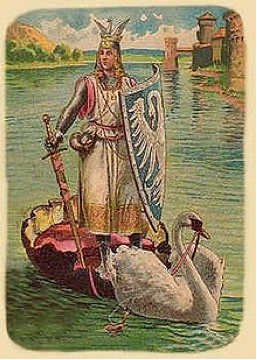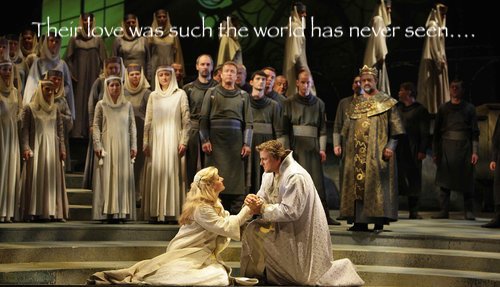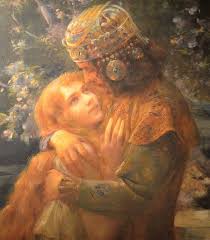 .
.
On my way to the dentist today I was trying to remember the name of the hygienist. I had a good guess, but wasn’t sure enough to blurt out, “Hi Kathy, how are you?” Which got me to thinking. Why was saying just “hi” not enough? What is so special about knowing someone’s name?
For the most part, names seem to be a way of relating to people on a special, more intimate level. I get that.
But interestingly a few days ago on the radio I heard about a medieval, 13th century story called, “The Swan Knight.” (The popular “Lohengrin” opera is based on it). Basically it is about a mysterious and powerful knight who is sent to an island on a swan boat, where there is a duke’s daughter, and a kingdom, in danger. The daughter’s name is Elsa, and the Knight can only act as her savior if she marries him, and, (this is the hard part) agrees never to ask his name, lineage, or where he came from!
It is an odd story I haven’t been able to get out of my head. Partly because “names” have been on my mind lately, having recently changed my name to contain my husband’s surname (and now going through all the work of changing it on bills, records, etc.) At first I was going to choose the English version of his name, but decided on my initial conviction to take on the Oliveira name, instead. The thought also came to me that a name is not what makes a person special, but what is inside. A person makes a name – a name does not make a person.
Obviously Elsa felt this way too, for she agreed to marry the Knight despite not knowing his name or understanding where he came from, and they enjoyed a wonderful relationship of tender, trusting love. Occasionally, however, the Knight mysteriously left on his swan boat, floating away for an unknown reason. It was hard, but Elsa didn’t have to ache for him too long. He always came back and comforted her, filling her life with love, friendship, and meeting all her physical needs, too. It was a match made in heaven.

(At this point I find the story to be strangely reminiscent to the opera-like story in the biblical Song of Songs. Rich with “pet names,” the character’s birth names are largely absent, particularly for the woman, and they strangely rendezvous at different times and places, rather than seeming to live together all the time.)
Anyway, I digress… :-)
The intriguing story then proceeds with an evil plot by a jealous Count (who wants the throne) to pressure Elsa to force the Knight to reveal more about himself. He does this by basically making Elsa think her Lover is holding something back from her, and that she is unloveable and insufficient for such a grand and powerful Knight. (What a devious combination of lies, huh?)
And maybe worse yet, that someday he will leave on his boat and not want to come back to her!
Actually, if you think this now sounds familiar with another story from the Bible – the Adam and Eve temptation in Genesis – I thought the same thing. And sadly this story takes a bad turn, too. The woman listens to the “Accuser’s voice,” and the next time her husband comes to her, she does not greet him with the same trusting warmth. Instead she breaks her promise, demanding to know what his name is, his lineage, and where he comes from!
The Knight is heart-broken. Not only because his beautiful bride, who trusted him so lovingly, suddenly was pulling back from him in fear and mistrust. But also because her betrayal meant that his supernatural power to protect her and be with her in the same way was broken, and he had to return back to where he came from!
In other words – her mistrust of him caused him unbearable pain and loss, as well as for her.
.
The Parable Unpacked
If you want a happy ending, that depends, of course, on where you stop your story. ~ Orson Welles
Although tragic, the “Swan Knight” story has a surprising twist at the end that appears to be a small glimmer of hope. It can be read in entirety here, along with many other details: http://www.aaronshep.com/stories/064.html. If you read it and have any thoughts, please share! It seems to be a story rich with parabolic meaning and it would be fun to explore it more with anyone who is likewise inspired by it.
Briefly, to me, the story speaks of being okay with the existence of divine mystery. In our position we do not have all knowledge and answers about the Divine Being that people call God, or the reasons He is not always felt or seen (supposedly not felt or seen, that is). The Creator obviously does not meet everyone’s expectations, no matter how religions try to package and sell their version of the Truth to those who demand certainty and control, instead of walking by faith.
But the story also speaks of being able to enjoy an intimate relationship, nonetheless, that is as rich and satisfying as any relationship that seemingly has full knowledge. I think this is where most people struggle: not seeing, therefore not believing. Add to this the voices in our head from society, religion, and our wounded upbringing – and we are tempted to lose the warmth of our initial, childlike trust. This is when we start drifting along a non-intimate path of knowing things about God, and going through religious motions, etc., but not having the joy or inner spiritual power that comes out of an authentic, trusting relationship.
There’s so much more that could be said on this subject.
For now it’s sufficient to say that this story has encouraged me towards wanting to guard the confidence and warmth of my relationship with the Beloved. It is a great comfort knowing (but not wanting to take advantage of the fact, either) that the mysterious, yet always faithful and loving “Knight” is with me, and with you, still.
.

P.S. Interesting Factoid: The song typically played in American weddings, “Here Comes The Bride,” comes from the Lohengrin opera based on this medieval Swan Knight story.

Love your writings…you have such a good heart Pam. Thanks for sharing. Love to you and Vinny
Posted this to facebook Pamela, nice to see you writing and this is lovely.
I am glad you thought it shareworthy, Richard. Nice to hear from you!